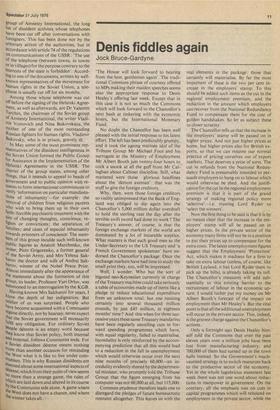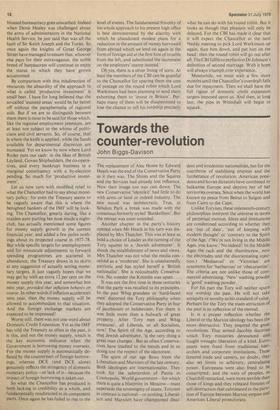Denis fiddles again
Jock Bruce-Gardyne
'The House will look forward to hearing from the hon. gentleman again'. The traditional Commons phrase of courtesy offered to MPs making their maiden speeches seems also the appropriate response to Denis Healey's offering last week. Except that in this case it is not so much the Commons which will look forward to the Chancellor's next bash at tinkering with the economic levers, but the International Monetary Fund.
No doubt the Chancellor has been well pleased with the initial response to his latest effort. The left has been predictably grumpy, and it took the ageing matinee idol of the Tribune Group Mr Michael Foot and his surrogate at the Ministry of Employment Mr Albert Booth just twenty-four hours to cock a snook at all the guff from Mr Callaghan about Cabinet discipline. Still, what mattered were those glorious headlines about the 'demon axeman': that 'was the stuff to give the foreign creditors.
Why, then, were those foreign creditors so visibly unimpressed that the Bank of England was obliged to dip again into the Chancellor's 5,000 million dollar overdraft to hold the sterling rate the day after the terrible swift sword had done its work ? The Treasury's answer, of course, is that the foreign exchange markets of the world are dominated by a lot of incurable sceptics. What matters is that such good men as the Under-Secretary to the US Treasury and 'a French Government spokesman' have endorsed the Chancellor's package. Once the exchange markets have had time to study the small print they, too, will be impressed.
Well, I wonder. Who but the sort of bigoted neo-Keynesian currently in charge of the Treasury machine could take seriously a table of economies made up of items like a pledge to reduce educational expenditure from an unknown total, but one running certainly into several thousand million pounds, by just £45 million, in eighteen months' time? And this when for three successive years these same Treasury mandarins have been regularly unveiling cuts in forward spending programmes which have, with equal regularity, failed to materialise. Incredulity is only reinforced by the accompanying prediction that all this would lead to a reduction in the fall in unemployment which would otherwise occur over the next nine months of precisely 60,000—an incredulity evidently shared by the departmental minister, who promptly told the Tribune Group that the figure emerging from his computer was not 60,000 at all, but 115,000.
Common prudence therefore leads one to disregard the pledges of future bureaucratic restraint altogether. This leaves us with the real elements in the package: those that certainly will materialise. By far the most important of these is the two per cent increase in the employers' stamp. To this should be added such items as the cut in the regional employment premium, and the reduction in the amount which employers can recover from the National Redundancy Fund to compensate them for the cost of golden handshakes. So let us subject these to closer scrutiny.
The Chancellor tells us that the increase in the employers' stamp will be passed on in higher prices. And not just higher prices at home, but higher prices also for British exports, so that we can resume our normal practice of pricing ourselves out of export markets. That deserves a prize of sorts. The cut in refunds from the National Redundancy Fund is presumably intended to persuade employers to hang on to labour which would otherwise be shed. And the justification for the cut in the regional employment premium is that it is part of the grand strategy of making regional policy more 'selective'—i.e. trusting Lord Ryder to 'select the winners'.
Now the first thing to be said is that it is by no means clear that the increase in the employers' stamp will all be passed on in higher prices. In the private sector of the economy many firms will not be in a position to put their prices up to compensate for the extra costs. The latest unemployment figures suggest that the Employment 'Protection' Act, which makes it madness for a firm to take on extra labour (unless, of course, like British Leyland, it has Lord Ryder there to pick up the bills), is already taking its toll. The Chancellor's measures will add substantially to this existing barrier to the recruitment of labour in the economic upturn. I would rather put my money on Mr Albert Booth's forecast of the impact on employment than Mr Healey's. But the vital point is that all the additional unemployment will occur in the private sector. This, indeed, is the gravest charge against the Chancellor's actions.
Only a fortnight ago Denis Healey himself told the Commons that over the past eleven years over a million jobs have been lost from manufacturing industry, and 700,000 of them had turned up in the town halls instead. So the Government's muchvaunted strategy is to switch resources back to the productive sector of the economy. Yet in the whole lugubrious statement last week there was not one word about reductions in manpower in government. On the contrary, all the emphasis was on cuts in capital programmes which will rebound on employment in the private sector, while the bloated bureaucracy goes unscathed. Indeed when Denis Healey was challenged about the army of administrators in the National Health Service, he just said that was all the fault of Sir Keith Joseph and the Tories. So once again the knights of Great George Street have managed to ensure that, whoever else pays for their extravagance, the noble breed of bureaucrats will continue to enjoy the status to which they have grown accustomed.
By comparison with this misdirection of resources the absurdity of the approach to what is called 'productive investment' is small beer. I have for long believed that the so-called 'assisted areas' would be far better off without the paraphernalia of regional aids. But if we are to distinguish between them there is most to be said for those which, like the regional employment premium, are at least not subject to the whims of politicians and civil servants. So, of course, that is where the knife is applied; while the funds available for departmental discretion are increased. Yet we know by now where Lord Ryder puts our cash : in the likes of British Leyland, Govan Shipbuilders, the co-operatives, and every bankrupt business in a marginal constituency with a by-election pending. So much for 'productive investment'.
Let us now turn with modified relief to what the Chancellor had to say about monetary policy: for even the Treasury seems to be vaguely aware that this is where the benighted bankers of the IMF will be looking. The Chancellor, greatly daring, like a maiden aunt putting her nose inside a nightclub, has actually mentioned some figures for money supply growth in the current financial year, and added a few polite nothings about its projected course in 1977-78. But while specific targets for unemployment and for minuscule adjustments to forward spending programmes are scattered in abundance, the Treasury draws in its skirts at any suggestion of actually setting monetary targets. It just vaguely hopes that we may get by with an extra 12 per cent on the money supply this year, and somewhat less next year, provided that inflation behaves on course. In other words if inflation accelerates next year, then the money supply will be allowed to accommodate to that situation. And the foreign exchange markets are expected to be impressed!
Worse still, there was not one word about Domestic Credit Expansion. Yet as the IMF has told the Treasury so often in the past, it is this, and not the money supply, which is the key economic indicator when the Government is borrowing money overseas. For the money supply is automatically deflated by the counterpart of foreign borrowings. whereas DCE (and DCE alone) genuinely reflects the stringency of domestic monetary policy—or lack of it—because the impact of foreign borrowing is taken out.
So what the Chancellor has produced is both lacking in credibility as a whole, and fundamentally misdirected in its component parts. Once again he has failed to rise to the level of events. The fundamental frivolity of his whole approach to his present high office is best demonstrated by the alacrity with which he abandoned modest plans for a reduction in the amount of money borrowed from abroad which we lend on again in the form of foreign aid at the first hint of trouble from the left, and substituted the increment on the employers' stamp instead.
Oh yes, there is a silver lining of sorts. At least the members of the CBI can be grateful to the Chancellor for sparing them the cost of postage on the round robin which Lord Watkinson had been planning to send them exhorting them to 'invest in Britain'. Perhaps many of them will be disappointed to lose the chance to tell his lordship precisely what he can do with his round robin. But it looks as though that pleasure will only be delayed. For the CBI has made it clear that it will expect the Chancellor at the next Neddy meeting to pick Lord Watkinson up again, dust him down, and pat him on the head: then the round robin will go out after all. The CBI fulfils to perfection DrJohnson's definition of second marriage. With it hope will always triumph over experience.
Meanwhile, we must wait a few more months until the Chancellor's overdraft falls due for repayment. Then we shall have the full rigour of domestic credit expansion targets imposed upon us. And then, at long last, the pips in Whitehall will begin to squeak.



































 Previous page
Previous page